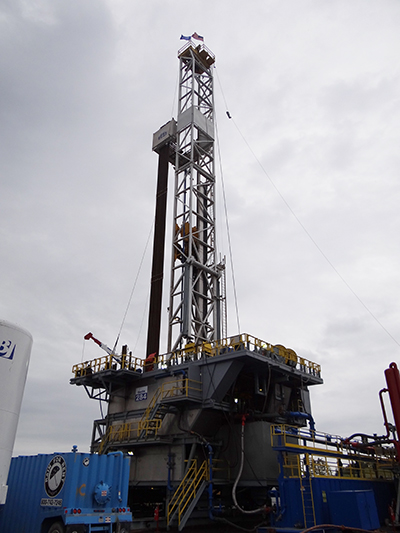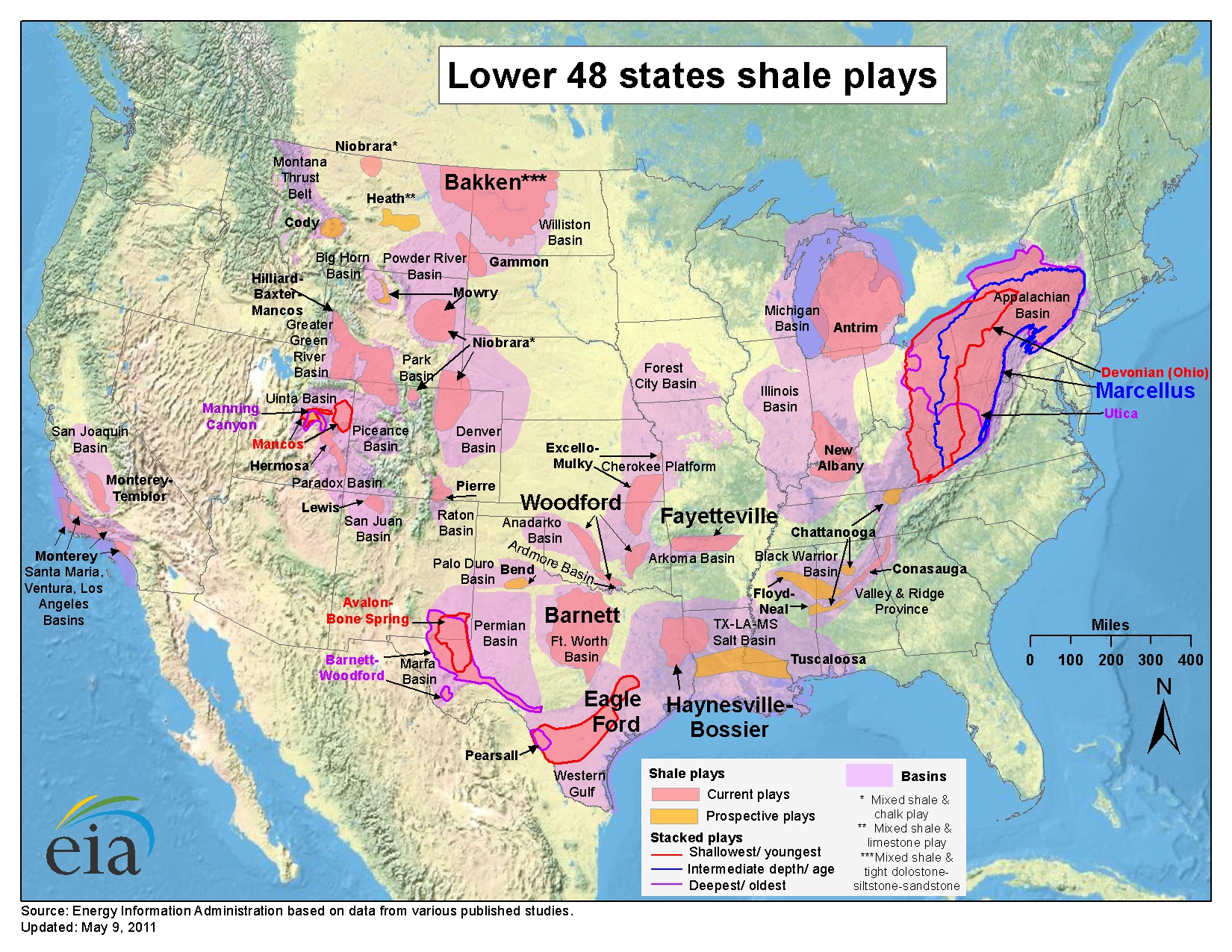In Search of a Reasonable Debate on Hydraulic Fracturing
One of the touchiest subjects in today’s discussion on environmental protection laws and energy independence is the exploration of the new natural-gas-retrieval technology known as hydraulic fracturing, or more commonly, “FRACKING.” The process consists of drilling a wellbore into a shale formation, which is like an underground pocket of natural gas, then pumping a mixture of water, sand, and undisclosed chemicals into the bedrock, creating tiny fractures in the sediment. The fractures release trapped fluids such as gas, petroleum, and uranium-infused brine water, and it all flows out through the well.
There are many questions for state officials to ask when deciding whether or not to allow companies to begin fracking anywhere in their states. Namely: what are the potential economic and social benefits of bringing a booming energy-collection industry into the state? And from another perspective, what are some possible environmental and health risks that come with this relatively new gas-extraction process?
The answers to these questions are not easy to come by. Much confusion is a result of both opponents and proponents of fracking screaming their versions of the truth at the top of their lungs on any media outlet that will allow it. Trying to search the web for answers is just as difficult, as search engine results are flooded with a cacophony of biased studies from self-interested non-profit organizations or corporately funded, cherry-picked research groups.
But fracking isn’t even the most controversial topic permeating the energy independence debate. That title goes to the question of “Should we even still be using fossil fuels at all?” A recent study published by the Union of Concerned Scientists (yes I am quoting a left-leaning non-profit, but it is made up entirely of professional scientists so I’m more inclined to believe them) shows that natural gas, although it is often referred to as a “clean” energy source, is actually anything but clean. People often think the main goal should be to simply replace the burning of coal with any more carbon-efficient energy source, and while natural gas does produce roughly half of the carbon dioxide emissions that coal does, it has its own greenhouse gas issues:
“Methane – a primary component of natural gas – leaks from drilling sites and pipelines. It is 25 times more potent than carbon dioxide at trapping heat. An estimated one to nine percent of all natural gas produced escapes into the atmosphere, equivalent to the global warming emissions from 26 – 231 typical-sized coal power plants (600 megawatts). This methane leakage poses additional climate risks and erodes the climate benefits of replacing coal with natural gas.”
So if switching to natural gas won’t even help curtail the greenhouse effect occurring in the Earth’s atmosphere, what is the point of all this drilling? Why are all these oil and gas companies hiring all these lawyers and lobbyists and news pundits to try to get politicians to allow them to set up more and more drilling sites? And to add complexity to the debate, what’s all this about “energy independence?” What does that even mean?
Energy independence is a nice way of saying “Hey America! Tired of having to get our gas from the Middle East? Let’s just dig up our own land and get it ourselves!” Which sounds great. It really does. No longer having to rely on an increasingly unstable part of the world for what is essentially the life-blood of our country would be a fantastic step forward. But if natural gas isn’t really clean energy, why should we use it? Maybe because 3 of the top 10 largest corporations in the world don’t make wind farms or solar panels; they extract, refine and transport oil.
It’s no surprise, then, that on August 9th, 2012, the Congressional Budget Office (the United States government’s approved economic prophets) came out with a projected budget outlining the hypothetical financial benefits of opening ALL federally protected lands to private businesses for oil drilling. The two most prominent pieces of protected land on the list are the Arctic National Wildlife Refuge (ANWR) and the Outer Continental Shelf (OCS), which is the submerged land 3-200 miles from the Atlantic, Pacific, and Florida coastlines. Then, of course, there’s all the protected land in the rest of the country. According to the CBO:
“…Gross royalties from leasing in ANWR would probably total between $25 billion and $50 billion (in 2010 dollars) during the 2023–2035 period, or roughly $2 billion to $4 billion a year.”
By comparison, CBO estimates that under current law gross receipts from all federal oil and gas-leasing activities in 2022 will be about $12 billion, in 2010 dollars.
So… is that good or bad? Realistically, it’s such an improbable situation with such an incalculable set of variables that it’s almost impossible to say what would happen. Obviously more money is good, but pumping more greenhouse gases into the atmosphere is not so good. But the CBO couldn’t just say that, they needed more details, so they came back to congress with the vaguest yet most technically accurate report they could. Chunks are torn from the report by hungry blogs and news outlets, eager to use the non-partisan math of the CBO to justify whatever opinions they are trying to convey in their article. Most issues in this country are divided into left vs. right, and on this issue the left is decidedly aligned with environmentalists and the right is aligned with the idea of energy independence…and, of course, paying our bills.
One of the Congressional Republicans’ biggest talking points (for decades) is ‘paying down the debt and deficit.’ Why is this? Well, on February 10th 2014, Senator Ted Cruz of Texas spoke at the conservative Heritage Foundation. The press release stated that he would soon introduce a bill that would use all additional revenue from expanded oil drilling, coal production, and fracking to pay down the national debt:
“The government will not solve our economic problems by controlling the economy or placing bureaucratic barriers to growth. The only thing that it must do is what it did in the Ronald Reagan era: get out of our way and let Americans do what they do best: dream, innovate, and prosper. It’s happening in Texas and it’s happening in North Dakota. Now, we just have to convince Washington to let it spread through the rest of America.”
The press release also framed his speech as a discussion about “infrastructure development.” This seems odd, as it’s often the Democratic Party that champions investing in America’s infrastructure. President Obama summed up the divide himself in a recent speech delivered in Washington:
“On jobs, we know that infrastructure would put people back to work right now and would improve our economy for the long term. It didn’t used to be a partisan issue. Why aren’t we coming up with a way to make sure that we’re rebuilding our roads and our bridges and improving our air traffic control system? There’s no reason that has to be political. There really isn’t any ideological disagreement on that.“
In this case, both President Obama and Senator Cruz agree that infrastructure is good, but are they really on the same page? Not exactly: while Barack Obama focuses more on varied, cross-sector infrastructureprojects, Ted Cruz tends to keep his mind focused on fossilized organic matter buried in sedimentary rock. If fossil fuel production continues in the world (not just in this country) or increases, the climate will get worse—BUT fracking in the United States is a good way for us to possibly get our economic heads above water.
That said, we need to remember that we are not the only living beings on this planet. We share it with many other creatures and we must be considerate to their homes as well. Considering how many oil spills and coal ash spills and coal mine cave-ins, oil rig explosions and pipeline leaks that’ve happened, it might be time to give our critter cousins a break for a few years. Here’s a look at the frequency of leaks in the fracking industry alone.
Not everyone agrees that animals, or the environment, deserve such respect. Some people believe that Earth belongs to the human race, it is ours to do with as we please. Those who do care about the environment are beginning to concede that the damage done to the atmosphere is irreparable and global warming cannot be stopped, much less reversed.
One of the major problems is that there is no more non-partisanship anymore. EVERY debate in this country is divided into “right or left,” which makes for lousy policymaking, and fracking is no exception. What should be taken into account are scientific facts and logical arguments, combined with a discussion of moral and ethical ideas. Logic and emotion mix about as well as oil and water (or oil and fracking chemicals, for that matter).
If we’re going to keep fracking, let’s at least talk about it reasonably.
Tags: Alex Coles, Fracking, Hydraulic Fracturing








 RSS Feed
RSS Feed